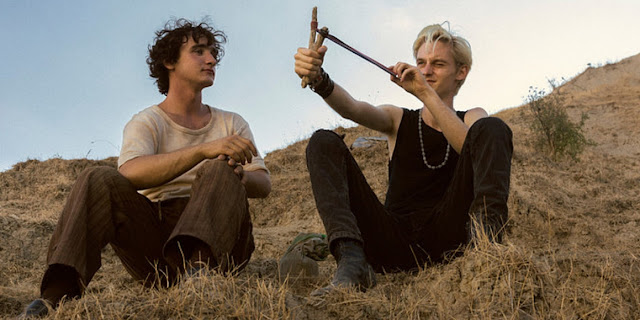Alice Rohrwacher's "Happy as Lazzaro" shares best screenplay award at Cannes

The best screenplay award at Cannes in the official selection went to Happy as Lazzaro written and directed by Italian filmmaker Alice Rohrwacher (shared with Jafar Panahi) It follows the trail of her previous film The Wonders, winner of the Grand Prix in 2014. Both films deal with a return to living conditions in rural areas in a time lapse during industrialization and are enchanting narratives. In The Wonders a young family lives off the land and harmonious raises bees even if the local authorities want to make sure the children are getting a proper education.
In Happy as Lazzaro, a colony of tobacco leaf pickers are subjected to unfair labor practices by the marchioness who owns the land. They are subject to pay docks and must attend compulsory religious education taught by the marchioness herself. Her family lives in luxury whereas the leaf pickers must also serve the family at mealtime and due menial chores. They are deprived of education and live a substandard life. All until the son of the marchioness, Tancredi, runs away to live in young Lazzaro’s hideaway in the hills. The hills are beset by wolves, which is one of the first sounds in this film set in the Italian countryside. When Tancredi and Lazzaro do not return home, they are assumed to have been eaten by the wolves. However, Lazzaro falls off a cliff miraculously survives, and returns home. He has not aged one bit whereas everyone else he grew up with has become adults including Tancredi. He is met by thieves who are plundering the derelict mansion of the marchioness. The children of the leaf pickers grow up and turn out to be part of the band of thieves who make their living off of selling the marchioness stolen goods or tricking people into buying merchandize they’ve stolen with tall tales.
Lazzaro is a happy go lucky young peasant who believes what he is told and is taken advantage of by the other peasants. Tancredi tries to convince him that they might be brothers because his father was a womanizer and might have courted Lazarro’s mother. For Lazarro this cements a permanent bond between them and even if the other grown children he played with continue to trick him, he retains his innocence. The direction of the film is masterly with a clear and whimsical sense of direction in the daily lives on the farm with colorful imagery and imaginative editing and composition of the frame.
When Lazarro returns to the modern world we learn that the marchioness who was criminally negligent to her workers is in prison. Only Lazarro retains his youthful naivety. The innocence of his character amidst the exploitation of his landlady and the tricks played on him by peers is what carries the film through. His purity makes him almost saint like and evokes the myth of Lazarus, risen from the grave after four days who was the brother of Mary and Martha in the New Testament. However, there is no overt religious symbolism in Happy as Lazarro, but the story of young man protected throughout life by sacred wolves.
In Happy as Lazzaro, a colony of tobacco leaf pickers are subjected to unfair labor practices by the marchioness who owns the land. They are subject to pay docks and must attend compulsory religious education taught by the marchioness herself. Her family lives in luxury whereas the leaf pickers must also serve the family at mealtime and due menial chores. They are deprived of education and live a substandard life. All until the son of the marchioness, Tancredi, runs away to live in young Lazzaro’s hideaway in the hills. The hills are beset by wolves, which is one of the first sounds in this film set in the Italian countryside. When Tancredi and Lazzaro do not return home, they are assumed to have been eaten by the wolves. However, Lazzaro falls off a cliff miraculously survives, and returns home. He has not aged one bit whereas everyone else he grew up with has become adults including Tancredi. He is met by thieves who are plundering the derelict mansion of the marchioness. The children of the leaf pickers grow up and turn out to be part of the band of thieves who make their living off of selling the marchioness stolen goods or tricking people into buying merchandize they’ve stolen with tall tales.
Lazzaro is a happy go lucky young peasant who believes what he is told and is taken advantage of by the other peasants. Tancredi tries to convince him that they might be brothers because his father was a womanizer and might have courted Lazarro’s mother. For Lazarro this cements a permanent bond between them and even if the other grown children he played with continue to trick him, he retains his innocence. The direction of the film is masterly with a clear and whimsical sense of direction in the daily lives on the farm with colorful imagery and imaginative editing and composition of the frame.
When Lazarro returns to the modern world we learn that the marchioness who was criminally negligent to her workers is in prison. Only Lazarro retains his youthful naivety. The innocence of his character amidst the exploitation of his landlady and the tricks played on him by peers is what carries the film through. His purity makes him almost saint like and evokes the myth of Lazarus, risen from the grave after four days who was the brother of Mary and Martha in the New Testament. However, there is no overt religious symbolism in Happy as Lazarro, but the story of young man protected throughout life by sacred wolves.
© 2018 - Moira Sullivan - Air Date: 06/06
/18
Movie Magazine International
Movie Magazine International
Comments
Post a Comment